Despite Higher Prices and Short Supply, Texas Heritage Turkey Farms Are Thriving
By Eniola Longe
Reporting Texas
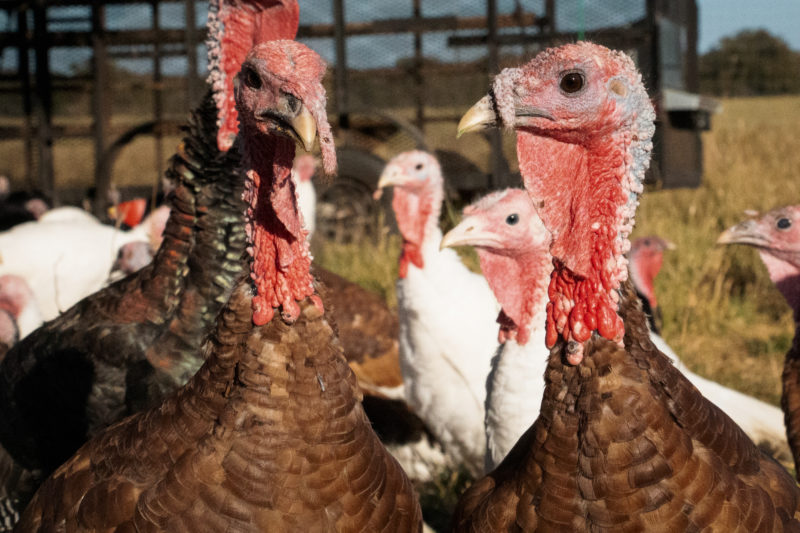
Two bourbon red turkeys are flanked by different breeds of heritage turkeys at Roam Ranch in Fredericksburg on Nov. 19, 2021. The turkeys were among the 350 turkeys Roam Ranch raised this year. Eniola Longe/Reporting Texas
FREDERICKSBURG — On 900 acres of river bottom land on the outskirts of Fredericksburg sits Roam Ranch. The smells of the countryside filled the air as Taylor Collins and wife Katie Forrest headed out to harvest some of the turkeys they’ve raised for the past seven months.
Huddled in a utility vehicle, they drove down to where the turkeys had been let out to pasture for the day. “We move our turkeys and all of our animals everyday,” Collins said, describing one way that they’re committed to regenerative agriculture.
At $9.99 per pound, all but a few of their birds had been reserved for a Thanksgiving Turkey Harvest event taking place the next day.
Hailing from Austin, the couple established Roam Ranch in 2017 to raise heritage turkeys, which are a variety of domestic turkeys retaining historic characteristics from the mid-20th Century. They tend to be smaller and more closely resemble turkeys found in the wild than the larger, mass-produced turkeys sold in most grocery stores at Thanksgiving.
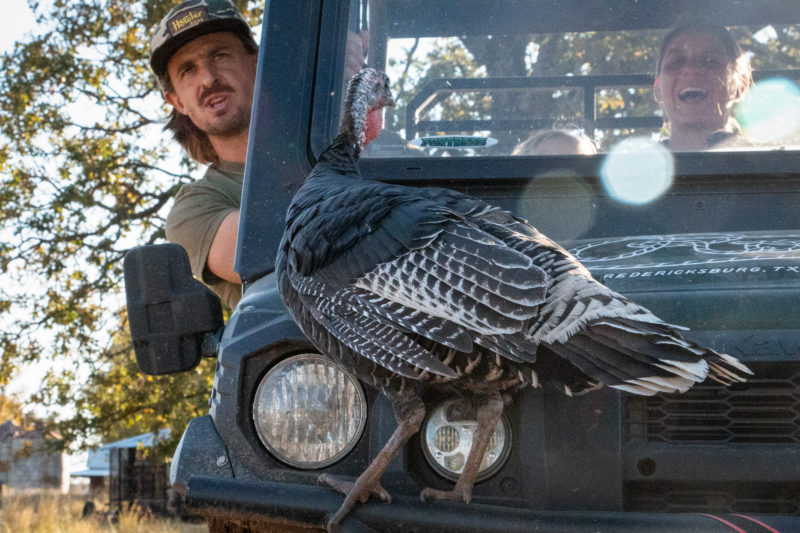
Taylor Collins, left, speaks to one of the Roam Ranch workers while Naomi Harrison, right, reacts to a turkey perched on the front of their vehicle on Nov. 19, 2021, in Fredericksburg. Eniola Longe/Reporting Texas
Across the country, the demand for heritage birds has been on the rise since 2005 with the popularity of the slow food movement. Year after year, poultry farms and ranches have sold out of heritage turkeys.
The American Livestock Conservancy census from 2015, the latest data available, found only 14,502 breeding heritage turkeys in the U.S spread across 364 breeders.
Roam Ranch’s turkeys receive their chicks, shipped a day after hatching, from Murray McMurray Hatchery in Iowa. Each year, Roam Ranch raises a new crop of turkey chicks for sale and butchering in the fall.
Roam Ranch originally wanted to raise 600 heritage turkeys this year but could not get them. It raised 350 instead.
“It sucked, because we had a hard time sourcing the birds for this year. Prices didn’t go up but availability went down really fast,” Collins said. “We are also seeing a resurgence of people wanting to be more involved, wanting to connect in a deeper way with their food and wield their consumer purchasing power.”
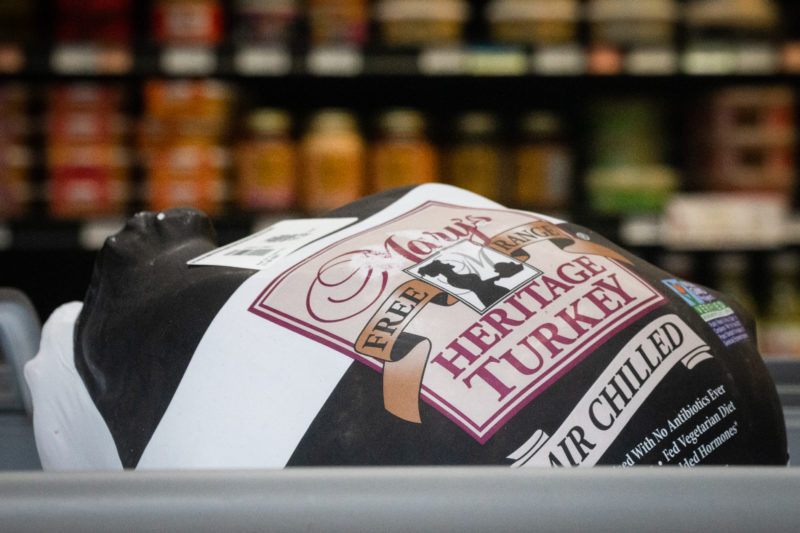
A Mary’s Heritage Turkey sits in one of the freezers at Wheatsville Co-op on Guadalupe Street in Austin on Nov. 17, 2021. Marketing Director Nicholas Conn said the store sold out of all 90 turkeys in stock. Eniola Longe/Reporting Texas
Texas-raised heritage turkeys were also in short supply for grocery stores, such as Austin’s Wheatsville Co-op.
“The farms we reached out to months ago had no turkeys for us,” said Nicholas Conn, Wheatsville Co-op’s marketing director.
Wheatsville was able to order heritage turkeys from Mary’s Turkeys in California and saw a $2/pound price increase over last year.
Farmhouse Delivery also saw a $2-per-pound price increase from its supplier, Rise and Shine Farms in Hempstead.
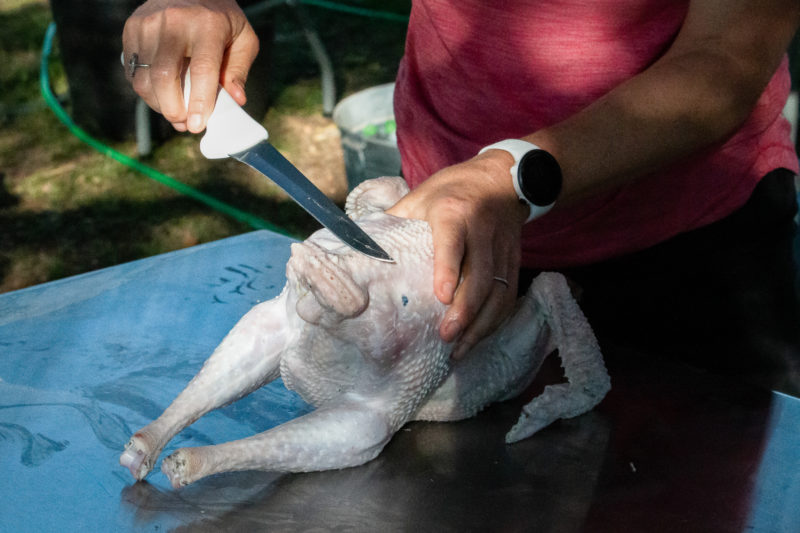
Roam Ranch co-owner Katie Forrest takes the first step to prepare the turkey for consumption. Eniola Longe/Reporting Texas
“We had to raise our price for the customers,” said Tony Briones, Farmhouse Delivery’s meat buyer. “But we still saw a high demand and we were glad.
“The reason we support them year-over-year is because we want to maintain the breed here in Texas,” Briones said. “I would encourage more people to find a local farm that has heritage turkeys or alternatively encourage your local farm to invest in heritage turkeys.”
Yu Yvette Zhang, associate professor in the department of agriculture economics at Texas A&M University, said the price increases largely stem from feed prices, labor shortages and supply chain disruptions.
She also noted that demand for the turkeys is higher than supply. “Heritage farms’ cost of production might have gone up but they are usually a bit hesitant to pass the price increase on to the end-consumer,” she said.
The Consumer Price Index Summary released Nov. 10, 2021, by the U.S. Bureau of Labor Statistics shows that poultry prices went up 11.9%.
Heritage turkeys are sold at a premium — on average, 300% over grocery store turkeys — reflecting the amount of work put into caring for every individual one.
“Our turkey is not processed, so our prices have not been affected at all,” said Brent Barry, owner and manager of the Stout Creek Farms in Saltillo. “We would never price gouge anybody or change our price; it’s not who we are.”
Despite the premium pricing, heritage turkeys sold out at six places surveyed across the country.
“We had 117 turkeys ranging in size from 7 pounds to 21 pounds. We had a run on our turkeys,” Barry said.
Collins sees a larger message in this year’s run on heritage turkeys.
“This is a wakeup call I think. If you want security in your food, if you want resilience in your systems then you need to try to branch out and support smaller independent producers,” Collins said. “This is an exciting time to shake things up and create a better system.”
For 2022, Collins plans to raise 500 turkeys and expects to encounter some supply chain issues. Though the ranch will not be starting a hatchery, they will be incubating their own eggs next spring, making more heritage turkeys available for more Texans next Thanksgiving.
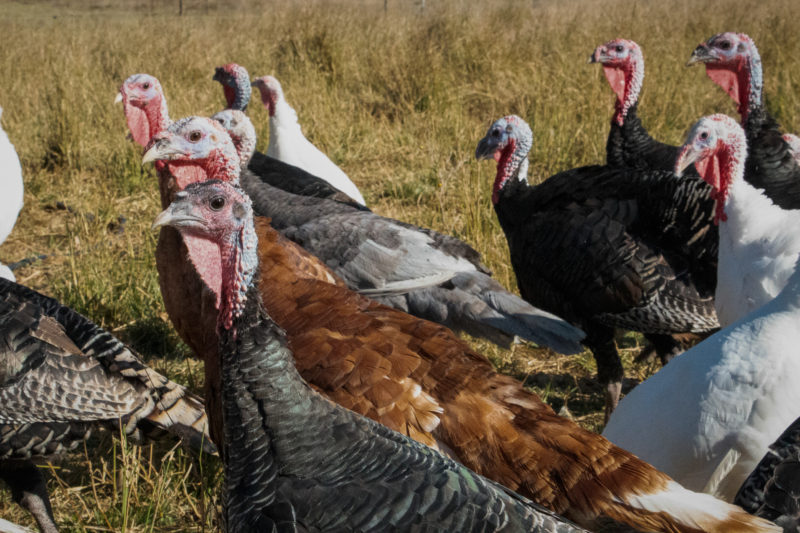
A cross-section of heritage breed turkeys at Roam Ranch in Fredericksburg on Nov. 19, 2021. Eniola Longe/Reporting Texas